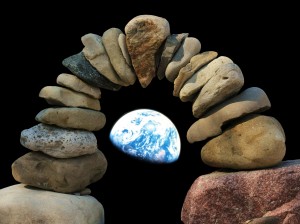
In response to a reader’s comment on last week’s blog post, The Ultimate Keystone Demonstration: Love, I said I often use the word “sacramental” to describe some of my experiences of engaging in civil disobedience. In that post I talked about what seem to me to be limitations of conventional civil disobedience, and yet over these past days I’ve also been thinking more about those moments when c.d. felt sacramental to me and why.
I think of a sacrament as a visible action using tangible elements that touches upon an intangible truth. A sacrament has the power to transcend the action and objects themselves, opening a portal to a Reality that is beyond our ordinary consciousness, and it always has at its heart the understanding that we are one with something much greater than ourselves.
As I’ve thought more about why certain moments of civil disobedience have felt sacramental to me, I realized that it wasn’t because of the actions in and of themselves: crossing the property line of a military base singing Amazing Grace or sitting in front of the doors to a Federal Building reading the Beatitudes. Rather it was because I and those I was with were choosing to abide within the understanding that we were one with each other, with those arresting us, and with a Reality that transcends us all.Continue Reading







